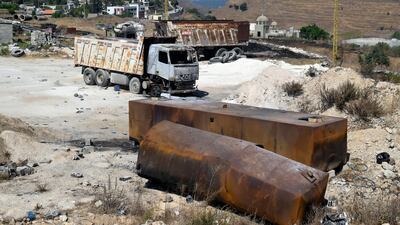A Lebanese judge indicted three people in connection with the explosion of fuel tanks that killed at least 31 people in the northern region of Akkar.
Judge Fadi Akiki, the acting government commissioner at the military court, charged George Ibrahim, the owner of the plot where the explosion occurred, and another man, Ali Sobhi Farag, with "storing inflammable materials in an unsafe manner … endangering the lives of citizens and causing the death of 31 soldiers and civilians”.
A third accused, Jerji Ibrahim, was charged with “triggering the fire”, the National News Agency reported on Thursday.
Mr Akiki asked the acting military investigating judge to issue arrest warrants for the three men.
The tanks exploded on August 15 as a crowd gathered to collect petrol that the army had confiscated and was distributing. Soldiers seized the fuel as part of a nationwide crackdown on hoarding and smuggling amid severe shortages across Lebanon that led to long queues and armed fights at petrol stations.
The fuel shortage, sparked by a growing economic and financial crisis, intensified this month as the central bank reduced its subsidy of fuel imports to conserve its dwindling foreign currency reserves.
Lebanon's national currency has lost more than 90 per cent of its value against the US dollar during the crisis, which unfolded in late 2019.
The crisis left the state-owned electricity company able to provide only two hours of power in a day. Private power generators that used to compensate for state rationing have been unable to operate because of the diesel shortage.
The power blackouts have affected water supply and internet connectivity, prompting international agencies to warn of the adverse effects on a struggling population.
The UN humanitarian affairs agency, Ocha, said this month that 78 per cent of Lebanon's population was now living below the poverty line, up from slightly more than 50 per cent a year ago.

